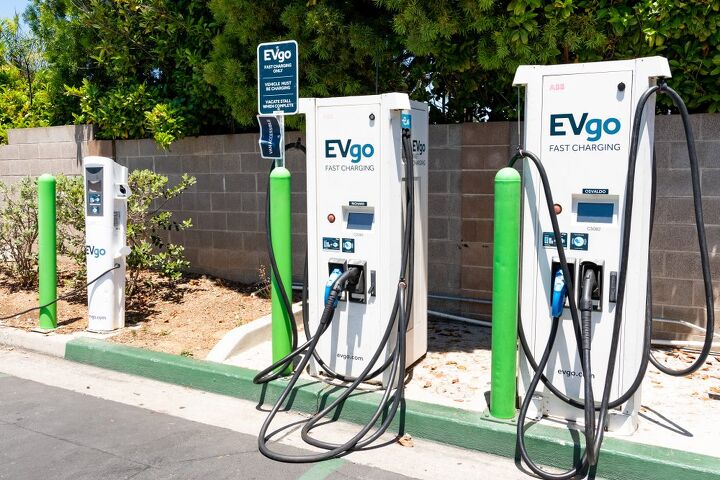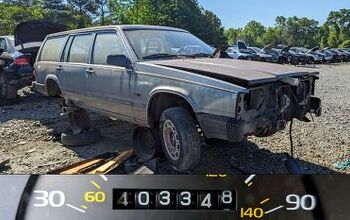EV Pricing Could Go The Way Of Gasoline Pricing. In Other News, Sky is Blue

Many so-called “analysts” in this industry more than live up to the first four letters in their name, either crying foul over something obvious or failing to recognize the trainwreck of a situation until it’s far too late. The latest? A specter of EV charging prices eventually going the way of gasoline prices, complete with dynamic pricing and unpredictable costs.
You know – things with which drivers of ICE-powered vehicles have been dealing with for decades.
There’s no doubt that pricing structure at EV fast charging stations have changed since they became a semi-regular sight in this country: per hour pricing, per kWh pricing, idle times, the lot. Proponents of per hour pricing say it’s a way to quash people parking their EVs at a charger for periods long after the thing has reached a one hundred percent charge, while the crowd championing per kWh structure argue it’s a far more balanced and fair way to mete out electrons.
Now, some groups – mainly ones who are in the game to make money – are sounding an alarm about companies which may introduce so-called surge pricing, a concept in which the cost of electricity spikes (pun intended) during periods of high demand. While the term took off in popularity thanks to companies like Uber, it’s a fact the practice has been around in fuel stations forever. Prices at the pump took off just in time for the long weekend? Gee. Tell me a new one. The amount posted per gallon fluctuates between the time you passed a station on the way to work and yer evening commute? Been going on for years.
All of which is to say: welcome to the real-world EV owners. The rest of us have been dealing with this nonsense since Christ was a cowboy. An advantage that drivers of electric cars do have is the notion that a suggested 80 percent of charging happens at home, either through the Level 1 chargers generally included with new EVs or via a Level 2 unit owners have installed in their garage. It’d be a lot more convenient for ICE gearheads, too, if we all had fuel pumps in our driveway (even if we had to pay to fill them, which is the closest allegory to having an EV charger at home, I guess; time for more coffee and to end this analogy).
Jacking prices at different times of the day will surely lead to more profitability for the companies which own these Level 3 chargers, a fine development so long as they plow a few bucks into maintaining the things and ensuring they work. Right now, there’s an excellent argument that building Level 3s is primarily a land grab for some companies; that is to say, they hoover up the prime spots, plunk their chargers in place, and forget about them until something better (or that chance to make more profits) comes along.
According to Automotive News, combined net losses for three of the biggest charging companies (ChargePoint, EVgo, and Blink) exceeded $600 million last year. Something’s gotta give – and it’s likely to be reflected in the cost of public charging.
[Images: Sundry Photography/Shutterstock; S&P Global]
Become a TTAC insider. Get the latest news, features, TTAC takes, and everything else that gets to the truth about cars first by subscribing to our newsletter.

Matthew buys, sells, fixes, & races cars. As a human index of auto & auction knowledge, he is fond of making money and offering loud opinions.
More by Matthew Guy
Latest Car Reviews
Read moreLatest Product Reviews
Read moreRecent Comments
- Golden2husky This was a common topic at work - kids learned how to drive, and now another car is needed. I was amazed at all the excuses made about how their kid must have a new car. Used cars are a "risk" for breakdown, they are not as safe, etc...which is all BS of course. How much difference in safety is there between a new car and the same model that is five years old? Maintained cars don't break down very often. I've driven cars for far, far longer than most and have been towed exactly twice in my entire driving career (about 800,000 miles). While I wouldn't put my daughter into a 15 year old car and let her drive across the country, I would be fine with a 5 year old car that was well cared for. Let's be realistic - new drivers are likely to get into a fender bender - why do that to a new car. I was thrilled to get an 8 year old car for college back in the day even though my folks could afford to buy all of us new cars if they wanted to. If you Want to buy your kid new, go ahead. Just don't freak out when they come home with a fresh dent.
- CanadaCraig Can you eventually go to prison for driving without a licence in the US?
- CanadaCraig To hell with the UAW.
- CanadaCraig First I'll answer the question. YES. Toyota, Mazda and Subaru are doing the right thing. That said... If only those pushing for an all EV world would care as much about the 1 BILLION earthlings that make less than $1 a day.
- Redapple2 All this BEV investment. A bigger impact (less oil consumption) would have been made if we had made PIG UP trucks smaller since 2000 and not HUGEr. (And raised gas tax by $2-3/gallon.)


































Comments
Join the conversation
Here's a radical thought. Let's stop subsidizing things. Everything. And see what things look like after they settle down a bit. Only then can consumers make informed decisions....
BIDEN KILOWATT HOURS!